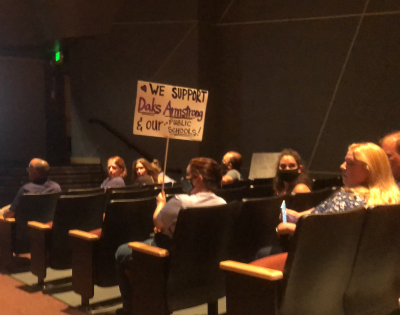Tensions Rise at Yorktown BOE Meeting Over Critical Race Theory, DEI Initiative
By Samuel Rowland

Yorktown school community members rushed to the defense of a high school guidance counselor last week who was targeted by a small group of critics because he apparently spoke at Black Lives Matters events last year.
Last Monday’s Yorktown Board of Education meeting was to feature discussion on the Diversity, Equity and Inclusion (DEI) initiative, which detractors have referred to as critical race theory in disguise.
Four days before the July 12 meeting, a video was posted on the Facebook page of Tatiana Ibrahim, the Carmel parent who made national headlines in June with a viral video accusing the Carmel Board of Education of “emotionally abusing” students through political indoctrination.
The video showed her talking to a Yorktown School District parent complaining about Daks Armstrong, a Yorktown High School guidance counselor who spoke at multiple Westchester Black Lives Matter (BLM) protests last June. She accused Armstrong of using his position to indoctrinate students before ending the video by calling for her followers to attend last Monday’s school board meeting to voice their anger.
The meeting was moved from its usual location in the Mildred E. Strang Middle School cafeteria to the high school auditorium in anticipation of a larger crowd.
Many who spoke at the meeting, districts residents and a few people from neighboring communities, were outraged that Ibrahim in her Facebook video, called Armstrong “Daks-boy.” Most had attended the meeting to show their support for Armstrong.
“The board has a duty to the community; the community has a duty to the board,” said resident George Price. “We should not let people who do not live in this community put up videos calling somebody that looks like me a boy. I’m offended by that. I’m a grown man. He is a grown man.”
In all, 37 of the 41 people who spoke at the meeting supported Armstrong and the district’s DEI initiative. The initiative could help children from minority groups feel more welcome and represented, most of the speakers agreed. Adjusting the curriculum to include more discussion of the history of racism and previously untaught minority contributions to world history would enhance the learning experience.
Price and others, including Ariana Okoth, vice president of the Peekskill Youth NAACP chapter, asked district officials for greater faculty diversity to replace the 35 retired teachers and staff that retired last year.
The four people who opposed the DEI initiative believed that the district was trying to have students agree with the ideology behind critical race theory against their parents’ wishes.
“DEI and CRT is trying to demonize the white race and create a stereotype that all white people are racist and that all minorities are incapable of succeeding,” Yorktown High School alumnus and college student Richard Giannasca said.
Common objections among the DEI opponents were the alleged shaming of white students for their race, an overemphasis on differences instead of common humanity and that any acknowledgement of experiences that differ by race is racist. Schools should also avoid injecting values that may conflict with the values their parents want to instill, they said.
The district’s new Superintendent of Schools Dr. Ronald Hattar addressed the controversy that had been expressed in numerous phone calls and e-mails prior to the meeting. Hattar rejected concerns that the new Culturally Responsive-Sustaining Education framework from the state Department of Education (SED) would institute a curriculum involving “anti-police rhetoric” and “anti-American perspective.” He called attention to district statements denying it is teaching critical race theory in school.
Hattar explained that teachers are banned from expressing political opinions in the classroom, but the district cannot enforce a ban on outside political speech.
Among the most memorable speakers of the evening were Walter Masterson and Maximillian Clark, two political satirists from New York City who used their time to lampoon DEI opponents. Masterson and Clark run a variety of social media accounts across several platforms under Masterson’s name in which they share videos from controversial right-wing events and interview attendees while appearing as supporters.
Masterson’s initial plan had been to do his interview routine with what he expected to be a crowd of anti-DEI protestors outside the school, but that didn’t materialize.

Examiner Media – Keeping you informed with professionally-reported local news, features, and sports coverage.
